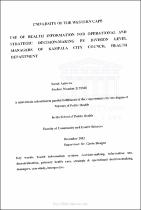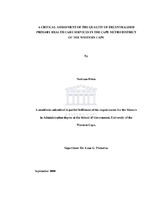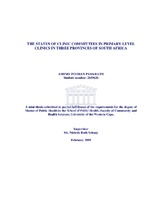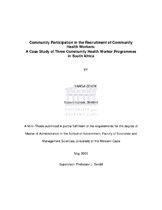Use of health information for operational and strategic decision-making by division level managers of Kampala city council health department
Abstract
In keeping with the goal of the world health organization to achieve health for all and reduce inequality, particularly with regard to resource allocation, health information generated by health information systems must be communicated to and utilized by decision makers. After all, a key indicator of the effectiveness of a health information system is the use of the information it generates.
When it was introduced in Uganda in 1996, the Health Management Information System (the data collection tool for Uganda) was said to replace all existing forms of data collection. In the year 2000, it was revised to make it more user friendly with the hope that it would meet the needs of the decision maker at all levels in the health structure, by providing timely, relevant, and accurate information, for use in decision-making. Since its revision however, it has not yet been documented whether the HMIS as the sole data collection tool has been able to meet the needs of the decision makers at all levels of the health system. This study was therefore carried out to provide valuable insights, based on the perceptions of the decision maker, on how accurate, timely, complete and relevant, information obtained from the HMIS is for decision makers, at the local level.
The study was a qualitative case study to determine the use of health information by decision makers of the health department of the Kampala city council (KCC) for operational and strategic decision-making. This is because this department has an obligation to provide health care for more than two thirds of the capital's population, especially the poorest communities. ln-depth interviews and one focus group discussion were used to gather information from managers at the division level, and from a public health committee of one of the divisions, respectively, who are responsible for decision making at this level of the KCC health structure.
Collections
Related items
Showing items related by title, author, creator and subject.
-
A critical assessment of the quality of decentralised primary health care services in the cape metro district of the Western Cape
Peton, Neshaan (2009)The complex and multi-facet decentralisation process of Primary Health Care services in the Cape Metro District of the Western Cape will be critically assessed in this thesis. Primary Health Care is the provision of ... -
The status of clinic committees in primary level clinics in three provinces in South Africa
Padarath, Ashnie Pooran (University of the Western Cape, 2009)In South Africa, governance structures in the form of clinic committees, hospital boards and district health councils are intended to provide expression to the principle of community participation at a local and district ... -
Community participation in the recruitment of community health workers: a case study of the three community health worker programmes in South Africa
Zembe, Yanga (University of the Western Cape, 2009)This research investigates the nature and extent of community participation and involvement in the recruitment and selection processes for Community Health Workers (CHWs), primarily through detailed case studies of three ...




